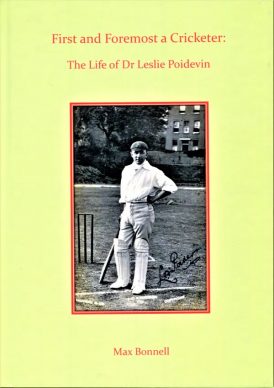First and Foremost a Cricketer: The Life of Dr Leslie Poidevin
Martin Chandler |Published: 2021
Pages: 96
Author: Bonnell, Max
Publisher: Red Rose Books
Rating: 4.5 stars

I knew a little of Les Poidevin before I read this excellent biography by Cricketweb favourite Max Bonnell. For years that knowledge was limited to the fact that he was a New South Welshman, a medical doctor and, above all, had played for a few years with some success for my beloved Lancashire during the ‘Golden Age’. In particular he had made a not insignificant contribution to a famous County Championship victory in 1904.
More recently I became aware, I cannot now recall how or why, that in addition to being a First Class cricketer Poidevin had also played Tennis to a high standard, and competed at Wimbledon and in the Davis Cup. I also learnt, last year, that he had done at least some writing, a piece he wrote about the legendary Victor Trumper appearing in Alfred James’ look at the great man’s career.
It is, in some ways, surprising that it has been possible for Max Bonnell to gather together as much material as he has about Poidevin. On the other hand Bonnell is, based on his previous biographies of Australian cricketers*, the most diligent of historians and a master of his craft, so the impressive list of sources at the back of the book is typical of the man.
The result of Bonnell’s work is that the Poidevin family history is fully set out in the early chapters of the book. Poidevin’s father was a teacher, but not a particularly successful one. Initially Poidevin started on the same career path as his father, before setting out on a quest to qualify as a doctor. All along his passions for cricket and tennis seem to have been the main focus of Poidevin’s life however. He became very good at both, but no more than that. As a cricketer he must have got reasonably close to a Test cap for Australia, but one never came, and as a tennis player whilst he was clearly a fine player his appearances in the Davis Cup were, essentially, as a result of geographical convenience.
On the other hand it would seem that Poidevin was not a particularly good doctor nor, in time, does he seem to have shone as either husband or father. As for his writing there was plenty of that as well, some of it quoted at length by Bonnell. Poidevin was certainly not a poor writer, although he was no Cardus. Workmanlike is probably a fair description of the bulk of his output, although there are some highlights, albeit not necessarily in a positive way. By way of example Bonnell reproduces a discourse on the dangers of relying on cricket statistics that is of such length it could certainly be described as a cure for insomnia as it stands. Against that background the comment at the conclusion of the quote to the effect that Bonnell had already abridged the essay was certainly unexpected. That example is then followed by a thankfully shorter piece on the subject of what Poidevin describes as the art of tossing. He is clearly of the view that this part of the game is not simply a question of luck, but his far from brief narrative fails to explain coherently what the rationale for his belief is.
The thorough way in with which Poidevin’s sporting career has been reconstructed is, in the internet age, not so surprising, unlike the manner in which Bonnell has been able to inform his reader as to what sort of a man his subject was. In large part that is of course the biographer’s skill, but given that Poidevin died almost a century ago it is still an impressive achievement to portray him as well as Bonnell does.
I have to say that, Lancashire title winner or not, I don’t think I like Les Poidevin very much. His failings as a family man (more through selfishness than abuse or neglect) do not help, but the sort of man who engages a solicitor to threaten to sue a newspaper for libel in the face a trenchant critique of his poor fielding is clearly not a pleasant one. There are a number of other examples of actions and words that do not endear Poidevin to the reader and, all in all, having spent a good deal of time with both Archie MacLaren and WG Grace, it is clear that some of their less desirable traits rubbed off on him.
In recent months I have wondered more than once what Max Bonnell spent his lockdown engaged in, and it is a great relief to learn that his time was well spent. Les Poidevin is not a man who occupies a notable place in the history of cricket, but he is a fascinating if flawed character of the sort who could never exist in the 21st century and his story is all the more interesting for that. First and Foremost a Cricketer: The Life of Dr Leslie Poidevin has been published by Red Rose Books in a limited edition of 125 copies which, I suspect, will sell out pretty swiftly. There are 111 paperbacks available at £12 including UK postage and, for those of us who like that sort of thing, 14 hardbacks (one for each of Poidevin’s First Class hundreds) at £50 a pop, although I suspect they may already have sold out. The book is highly recommended
*The men who have previously been the subject of a Max Bonnell biography are
Tom Garrett, Sammy Jones, Reginald Allen and Rowley Pope






Leave a comment